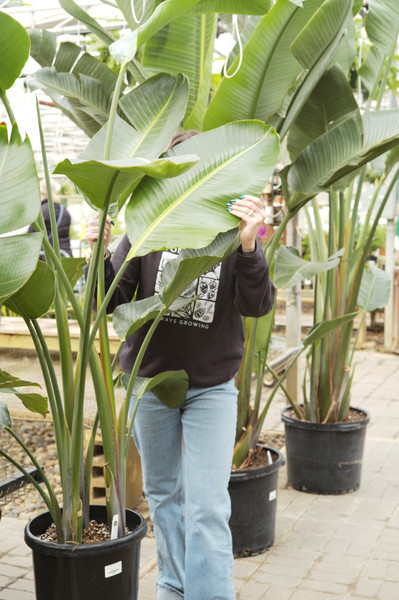Bird of Paradise
Posted by Hannah Brand on Jan 27th 2025
Weekly Plant Chat: Bird of Paradise
Hey Plant Friends!
This week we are talking about Strelitzia nicolai, more commonly known as Bird of Paradise. Named for Charlotte of Mecklenburg-Strelitz, the queen consort of King George III of England, and an amateur botanist, this plant has been popular since the 18th century. Strelitzia reginae (of the queen) is known for its vibrant blooms which resemble the head and beak of a colorful tropical bird. However, a blooming Bird of Paradise is not all that realistic in northern homes. That’s why Strelitzia nicolai, or White Bird of Paradise, is commonly offered as an indoor plant. This variety has larger, and broader leaves with insignificant blooms.
Family of Origin
This incredibly popular tropical plant belongs to the Strelitziaceae plant family, which is relatively small, and is native to South Africa.
Plant Care
Light
This tropical plant loves bright light including some direct light throughout the day. Place in a bright window with a huge view of the sky for best results. If you plant to move your plant outdoors for the summer, this plant can take the heat if acclimated to a full sun location.
Soil
Plant your Bird of Paradise in a well-draining soil like the Espoma's Organic Potting Mix or our house blend Tonka Terra with added Perlite.
Water
Make sure that your pot has adequate drainage, and never let your bird sit in standing water. When watering, allow the top 2-3 inches of soil to dry before giving it a good drink. Increase watering during active growth and leaf expansion.
Fertilizer
Fertilize weekly during periods of active growth with an all-purpose fertilizer such as Schultz All-Purpose Liquid Fertilizer. As growth slows in the winter months, fertilization may not be needed.
Hot Tips
Watch out for mealy bugs. They love to hide in the stalks of the plant and on the undersides of the leaves. Scout for pests every time you water and keep Bonide's Insecticidal Super Soap on hand to treat as needed.
Bird of Paradise can be toxic to our furry friends and is not considered a pet safe plant.
Shop Now!
Bird of Paradise are available in 10”, 12", 14", and 17" pots in the greenhouse.
Always approachable and happy to help!

